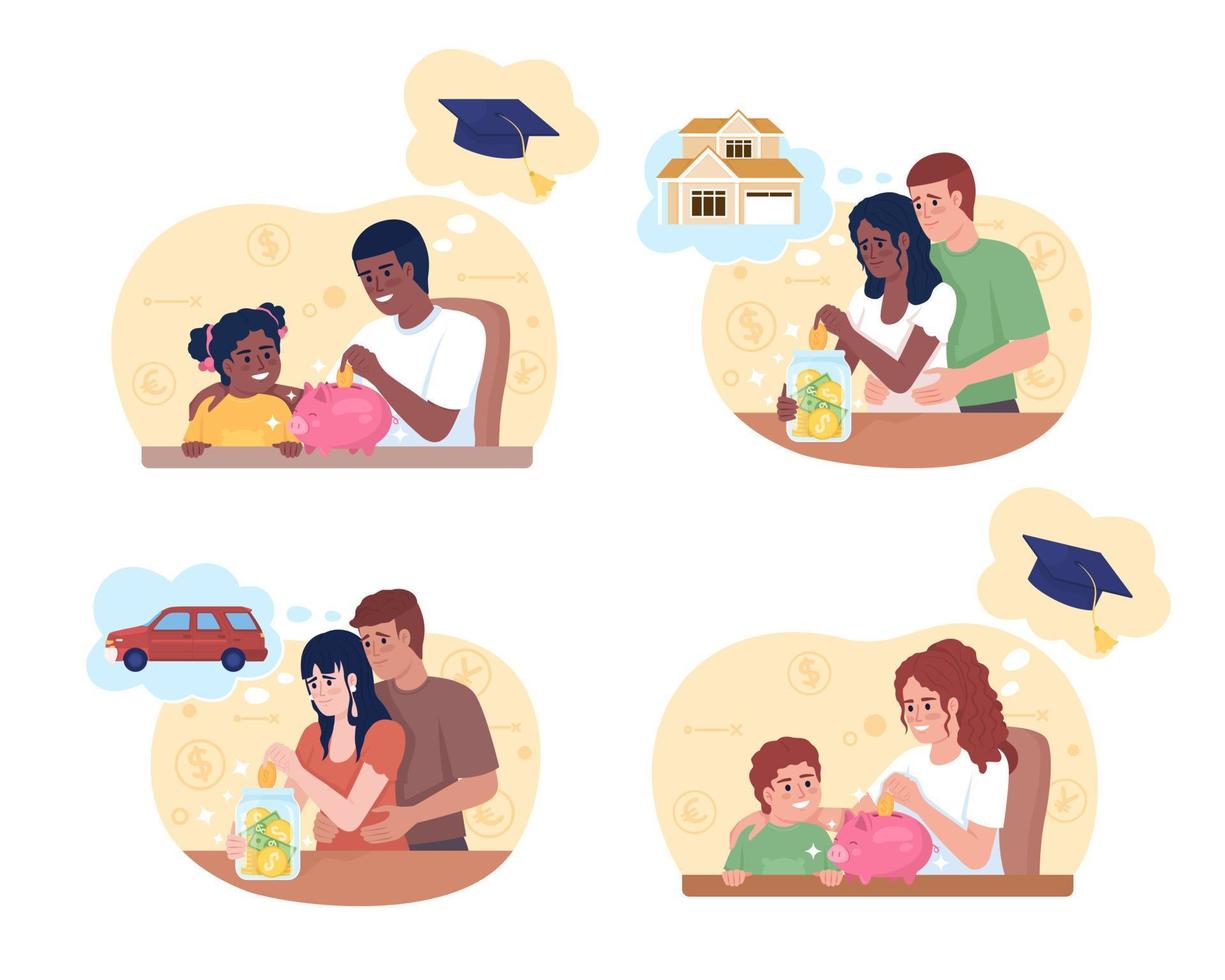In today’s dynamic world, the role of the earning member extends far beyond providing financial support; it encompasses safeguarding the well-being and stability of the entire family, even beyond life’s uncertainties. This article underscores the importance of creating a fallback system to ensure continuity of care and support for loved ones. From proactive financial planning to nurturing meaningful relationships and considering alternative living arrangements like family homes, every step taken contributes to building resilience and fortifying family bonds. By investing in both financial security and supportive networks, earning members can fulfill their primary responsibility of caring for their family’s future, ensuring their lasting welfare and prosperity.

The intended readers of this article are primarily earning members or individuals responsible for the financial and emotional well-being of their families. This could include parents, spouses, or caregivers who play a central role in providing for and protecting their loved ones. Additionally, the article may also be relevant to anyone interested in family planning, financial stability, and building supportive networks within their community.
Readers can use the information provided in this article to:
- Assess their current financial situation and identify potential risks to their family’s stability.
- Develop a comprehensive financial plan that includes measures to ensure continuity of support in the event of unexpected circumstances.
- Cultivate meaningful relationships with extended family members, neighbors, and community networks to create a strong support system.
- Consider alternative living arrangements, such as family homes or communal living, as a safety net for extreme emergencies.
- Take proactive steps to protect their family’s future by investing in passive income-generating methods, purchasing life insurance, and prioritizing legacy planning.
By leveraging the insights and strategies outlined in the article, readers can empower themselves to navigate life’s challenges with confidence, ensuring the long-term well-being and prosperity of their families.

I. Introduction: The Critical Role of the Earning Member
In the bustling streets of urban life, amidst the cacophony of responsibilities and aspirations, there lies an unsung hero—the earning member. Picture this: a father tirelessly juggling work commitments while secretly battling the anxiety of ensuring his family’s financial stability. Or perhaps a mother, diligently managing household affairs while silently shouldering the weight of her loved ones’ futures. These individuals, often unsung and overlooked, are the backbone of family stability.
According to recent studies, a staggering 60% of families in the United States rely on the income of one primary earner to meet their financial needs. This statistic underscores the pivotal role played by earning members in safeguarding the well-being of their families. Yet, amidst the daily grind, it’s easy to overlook the broader responsibilities that come with this role—responsibilities that extend far beyond one’s own lifetime.
Enter the central theme of our discourse: the creation of a fallback system to protect the family beyond the earning member’s lifetime. In this article, we’ll delve into the crucial steps that earning members can take to ensure the long-term stability and prosperity of their families. From proactive financial planning to cultivating meaningful relationships and considering innovative living arrangements, we’ll explore the actionable strategies that empower earning members to become true guardians of their family’s future.
So buckle up, dear reader, as we embark on a journey to unravel the secrets of family fortitude and resilience. It’s time to equip ourselves with the tools and knowledge needed to navigate life’s uncertainties with confidence and grace. After all, in the game of life, family stability is the ultimate prize worth fighting for.

II. The Role of the Earning Member: Beyond Breadwinning
In the intricate tapestry of family dynamics, the earning member dons the mantle of provider and protector—a role steeped in tradition and laden with responsibility. From time immemorial, society has bestowed upon this individual the weighty task of ensuring the financial security and well-being of their loved ones. But beyond the paycheck and the material provisions lies a deeper, more profound commitment—a commitment to the holistic welfare of the family unit.
Traditionally, the earning member is expected to be the primary breadwinner, bearing the brunt of financial burdens and shouldering the responsibility of meeting the family’s material needs. Yet, this role transcends mere financial transactions; it encompasses a myriad of emotional and practical responsibilities that form the bedrock of familial stability.
Emotionally, the earning member serves as a pillar of strength, offering unwavering support and guidance in times of adversity. Whether it’s lending a listening ear to a child’s fears or offering words of reassurance to a spouse facing challenges, the earning member plays a pivotal role in nurturing a sense of security and stability within the family unit.
Practically, the earning member is tasked with making strategic decisions that impact the family’s long-term welfare. From budgeting and financial planning to investing in education and healthcare, every choice is made with the family’s best interests at heart. This requires a steadfast commitment to prudent stewardship and a willingness to sacrifice personal desires for the greater good of the family.
Yet, amidst the weight of these responsibilities, the earning member finds solace in the knowledge that their efforts serve a noble purpose—that of safeguarding the sanctity of family bonds and ensuring a legacy of love and prosperity for generations to come. It is this unwavering dedication to the family’s welfare that distinguishes the earning member as not just a provider, but a guardian of familial harmony and resilience.

III. Extending Care Beyond Life’s Uncertainties: A Legacy of Love
In the grand symphony of life, the earning member plays a pivotal role as the conductor of familial harmony and stability. Yet, as mortal beings navigating the ebb and flow of existence, we are acutely aware of life’s inherent uncertainties. It is in these moments of reflection that we confront a sobering truth: familial responsibility transcends the boundaries of mortality, persisting long after the earning member’s passing.
Indeed, the enduring nature of familial responsibility is a testament to the indelible bonds that bind generations together. Beyond the confines of one’s lifespan, the legacy of care and support endures, weaving a tapestry of love and resilience that spans the ages. This concept of generational care speaks to the timeless truth that our actions today have far-reaching implications for the well-being of future family members.
Consider, for instance, the importance of legacy planning—a strategic endeavor aimed at preserving and enhancing the family’s wealth and well-being for future generations. From estate planning and asset management to imparting values and wisdom to future heirs, legacy planning ensures that the earning member’s legacy of love and prosperity lives on long after they have departed this world.
But legacy planning is not just about financial assets; it’s about imparting a sense of purpose and identity to future generations. It’s about instilling values of resilience, integrity, and compassion that serve as guiding principles for navigating life’s challenges. In this way, the earning member’s impact transcends the material realm, leaving an indelible imprint on the hearts and minds of those they leave behind.
So, dear reader, let us not be daunted by the specter of life’s uncertainties. Instead, let us embrace our role as stewards of family legacy, committed to nurturing a culture of love and resilience that transcends the boundaries of time and space. For in the end, it is not the wealth we amass or the accolades we receive that define our legacy—it is the depth of our love and the strength of our bonds that endure for eternity.

IV. Investing in Family Financial Safety: Securing Prosperity for Generations
In the ever-changing landscape of the modern world, financial stability stands as a beacon of reassurance amidst the storm of life’s uncertainties. For the earning member, proactive financial planning serves as the cornerstone of safeguarding the family’s well-being, ensuring a legacy of prosperity that transcends generations. Let us delve into the significance of such foresight and the practical strategies that underpin it.
First and foremost, proactive financial planning is not merely a luxury—it is a necessity. By taking a proactive approach to financial management, earning members can mitigate risks and prepare for unexpected challenges, thereby safeguarding the family’s financial stability in both the short and long term. This entails creating a comprehensive financial roadmap that encompasses budgeting, savings, investments, and risk management strategies tailored to the family’s unique needs and goals.
One powerful tool in the earning member’s arsenal is the pursuit of passive income-generating methods. These methods offer a reliable source of revenue that requires minimal ongoing effort, allowing earning members to diversify their income streams and build a robust financial foundation for their loved ones. Examples of passive income-generating methods include investments in stocks, bonds, and real estate, as well as royalties from intellectual property or business ventures.
Consider, for instance, the potential benefits of investing in rental properties—a time-tested strategy for generating passive income. By acquiring income-generating properties and renting them out to tenants, earning members can enjoy a steady stream of rental income that can supplement their primary earnings and provide a source of financial stability for the family.
Moreover, earning members should consider the invaluable protection offered by life insurance as a safety net for their loved ones in the event of their untimely demise. Life insurance provides a financial cushion that can help cover immediate expenses, such as funeral costs and outstanding debts, while also replacing lost income and providing for the family’s ongoing financial needs. With the right life insurance policy in place, earning members can rest assured knowing that their family’s financial future is safeguarded, regardless of what life may bring.
In essence, investing in family financial safety is not just about securing wealth—it’s about securing peace of mind. By taking proactive steps to plan for the future, earning members can build a legacy of prosperity that transcends generations, ensuring that their loved ones are well-equipped to thrive in an uncertain world. So let us seize the opportunity to invest in our family’s financial future today, knowing that the fruits of our labor will endure for generations to come.

V. Cultivating Meaningful Relationships: The Bedrock of Family Resilience
In the intricate web of human existence, relationships serve as the threads that bind us together, weaving a tapestry of love, support, and belonging. For the earning member, cultivating meaningful relationships with extended family members, neighbors, and community networks is not just a nicety—it is an essential component of safeguarding family resilience and well-being. Let us explore the profound significance of these connections and the invaluable support they provide during times of need.
At the heart of familial resilience lies the interconnectedness of extended family members—the aunts, uncles, cousins, and grandparents who form the fabric of our familial tapestry. These relationships, forged through shared experiences and familial bonds, offer a source of strength and solidarity during life’s trials and tribulations. By nurturing strong bonds with extended family members, earning members create a support network that transcends the confines of immediate family, providing a safety net of emotional support, practical assistance, and shared wisdom that enriches the lives of all involved.
Equally vital are the relationships forged within the broader community—the neighbors, friends, and acquaintances who comprise our social ecosystem. These connections offer a sense of belonging and interconnectedness that fosters resilience and well-being. Whether it’s lending a helping hand during times of crisis, providing a listening ear during moments of vulnerability, or simply sharing in the joys and sorrows of everyday life, these relationships serve as pillars of support that sustain us through life’s ups and downs.
Indeed, the role of these relationships in providing emotional support, practical assistance, and a sense of belonging cannot be overstated. During times of need, it is often these connections that offer a lifeline, providing comfort, reassurance, and tangible assistance when it is needed most. From organizing meals for a family in mourning to rallying together to support a neighbor in need, the power of community is a force to be reckoned with—one that strengthens bonds and fosters resilience in the face of adversity.
So let us not underestimate the importance of cultivating meaningful relationships in safeguarding family resilience and well-being. By investing in these connections, earning members lay the foundation for a resilient and thriving family unit—one that draws strength from the collective support of extended family, neighbors, and community networks. In doing so, we ensure that no family member stands alone, but rather, stands together with a network of love, support, and solidarity that transcends the trials and tribulations of life.

VI. The Concept of Family Homes: A Sanctuary in Times of Crisis
Amidst the hustle and bustle of modern life, the concept of family homes or communal living arrangements emerges as a beacon of resilience—a sanctuary in times of crisis that offers solace and security to those in need. Drawing inspiration from cultural practices and traditions around the world, such as those found in the lush hills of Coorg, these arrangements serve as a safety net for extreme emergencies, providing a refuge for families facing adversity. Let us delve into the cultural and practical aspects of family homes, exploring their role as a bastion of support and solidarity in times of need.
At its core, the concept of family homes embodies the timeless values of kinship and community—the idea that families are not just individuals bound by blood, but interconnected units woven together by shared experiences and mutual support. In times of crisis, families often turn to these communal living arrangements as a means of pooling resources, sharing burdens, and weathering the storm together. Whether it’s a shared residence where multiple generations coexist under one roof or a designated gathering place where extended family members come together during times of need, the concept of family homes serves as a tangible expression of solidarity and resilience.
In places like Coorg, nestled amidst the verdant hills of southern India, the tradition of family homes runs deep, rooted in centuries-old customs and cultural practices. Here, families come together to build sprawling estates known as “ainmanes,” where multiple generations reside under one roof, fostering a sense of unity and continuity that transcends the passage of time. These ainmanes serve not only as physical dwellings but as centers of community life, where families gather to celebrate festivals, conduct rituals, and support one another through life’s trials and tribulations.
Yet, the concept of family homes extends beyond cultural heritage—it speaks to a universal human need for connection and belonging, particularly in times of crisis. In today’s fast-paced world, where the pressures of modern life can often leave individuals feeling isolated and alone, the idea of communal living arrangements offers a ray of hope—a reminder that no one need face adversity alone, but rather, can find strength and support in the embrace of family and community.
In conclusion, the concept of family homes stands as a testament to the enduring power of kinship and solidarity—a sanctuary in times of crisis that offers hope, resilience, and unity to those in need. Whether inspired by cultural traditions or forged through shared experiences, these communal living arrangements serve as a beacon of light in the darkest of times, reminding us that we are stronger together than we could ever be apart.

VII. Implementing a Fallback System: Building Resilience for the Future
As earning members, we bear the weighty responsibility of not only providing for our families in the present but also safeguarding their future against life’s uncertainties. To this end, implementing a fallback system—a comprehensive strategy to ensure the long-term stability and resilience of our families—is paramount. In this section, we’ll explore actionable steps that earning members can take to establish a robust fallback system, offering practical advice on financial planning, relationship-building, and considering alternative living arrangements.
Assess Your Financial Situation: Begin by conducting a thorough assessment of your family’s financial situation. Take stock of your assets, liabilities, and expenses, and identify potential risks to your financial stability.
Create a Comprehensive Financial Plan: Develop a comprehensive financial plan that encompasses budgeting, savings, investments, and risk management strategies tailored to your family’s unique needs and goals. Consider consulting with a financial advisor to ensure that your plan aligns with your long-term objectives.
Diversify Income Streams: Explore opportunities to diversify your family’s income streams, such as pursuing passive income-generating methods like investments, rental properties, or royalties. By diversifying your sources of income, you can mitigate risks and create a more resilient financial foundation for your family.
Purchase Life Insurance: Invest in life insurance policies to provide a safety net for your family in the event of your untimely demise. Life insurance can help cover immediate expenses, replace lost income, and ensure that your loved ones are financially protected in the event of a tragedy.
Cultivate Meaningful Relationships: Nurture strong bonds with extended family members, neighbors, and community networks. These relationships serve as a source of emotional support, practical assistance, and a sense of belonging during times of need.
Consider Alternative Living Arrangements: Explore the possibility of alternative living arrangements, such as family homes or communal living, as a safety net for extreme emergencies. These arrangements provide a refuge for families facing adversity, offering a sense of security and solidarity in times of crisis.
Take Proactive Measures: Above all, take proactive measures to ensure the long-term stability and resilience of your family. Regularly review and update your financial plan, stay connected with your support network, and remain vigilant to emerging risks and opportunities.
In conclusion, implementing a fallback system is not just a prudent financial strategy—it’s a commitment to safeguarding the well-being and prosperity of your family for generations to come. By taking proactive steps to establish a robust fallback system, earning members can navigate life’s uncertainties with confidence, knowing that their loved ones are well-equipped to thrive in any situation.

VIII. Conclusion: Securing Family Futures
As we draw the curtains on our exploration of building resilience and fortitude within our families, it becomes abundantly clear that the role of the earning member transcends mere provision—it encompasses the solemn duty of safeguarding the future well-being of our loved ones. Throughout this discourse, we have delved into the importance of creating a fallback system—a comprehensive strategy that ensures the long-term stability and resilience of our families. Let us recap the key points discussed and reaffirm our commitment to prioritizing our family’s well-being.
We began by acknowledging the pivotal role of the earning member in shouldering the responsibility of financial security and emotional support within the family unit. From there, we explored the significance of extending care beyond life’s uncertainties, emphasizing the enduring nature of familial responsibility and the importance of legacy planning for future generations.
Moving forward, we delved into practical strategies for implementing a robust fallback system, including proactive financial planning, cultivating meaningful relationships, and considering alternative living arrangements. By taking proactive measures to diversify income streams, purchase life insurance, and nurture supportive networks, earning members can create a safety net that shields their families from life’s unpredictable twists and turns.
In conclusion, let us reaffirm our commitment to prioritizing our family’s well-being above all else. Let us recognize that the seemingly thankless job of the earning member is, in fact, a noble calling—a calling to protect and nurture the ones we hold dear. As earning members, it is incumbent upon us to take action today to protect our family’s future, no matter how daunting the task may seem. Together, let us rise to the challenge and build a legacy of love, resilience, and prosperity that endures for generations to come. The time is now—let us seize it with courage and conviction.
The MEDA Foundation stands as a beacon of hope and support for families worldwide, unwavering in its commitment to nurturing the well-being and resilience of every individual within the family unit. With a steadfast dedication to empowering families to thrive, the foundation channels its resources and expertise towards initiatives that address the multifaceted needs of modern families. From providing financial literacy programs and access to affordable healthcare to fostering community connections and promoting mental health awareness, the MEDA Foundation strives to create a nurturing environment where families can flourish. Through its holistic approach to family well-being, the foundation seeks to instill a sense of hope, stability, and belonging within every household it serves, ensuring that no family is left behind in the journey towards a brighter future.









